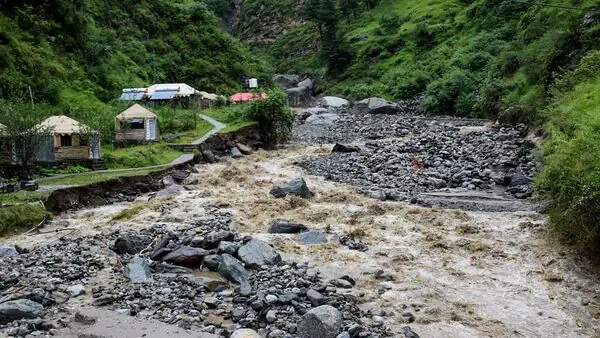06-SEP-2025, 12:00PM Himachal rains have once again disrupted normal life in the hill state, affecting pilgrimage routes, roads, and essential services. Over the past week, torrential rainfall triggered landslides, flash floods, and road blockages in several districts. However, with a slight improvement in weather conditions, authorities managed to airlift 64 stranded pilgrims from Bharmour in Chamba district. The development has brought relief to families awaiting updates on their loved ones and renewed hope for smoother rescue operations across the region.
Himachal Rains : Relief for Stranded Pilgrims
Himachal Rains : Airlifting Operation from Bharmour
In the wake of the continuous Himachal rains, many devotees visiting temples and shrines in Chamba found themselves stranded due to blocked mountain roads. On Tuesday, the Indian Air Force, in coordination with the state government, successfully airlifted 64 pilgrims from Bharmour, one of the worst-affected areas. The rescued individuals were provided food, medical assistance, and temporary shelter before being reunited with their families.
Himachal Rains : Weather Situation Improves Slightly
Authorities noted that the weather showed some improvement, which made the rescue operation possible. While Himachal rains remain a concern, the intensity has reduced compared to previous days, offering much-needed respite to both locals and tourists. Meteorologists, however, have warned that the state is not entirely out of danger, as sporadic showers could continue over the coming week.
Himachal Rains : and Their Impact
Himachal Rains : Disruption of Pilgrimage Routes
The holy sites in Himachal Pradesh attract thousands of devotees every year. Unfortunately, Himachal rains have caused heavy disruptions to pilgrimage routes, particularly those leading to Chamba, Kinnaur, and Mandi. Landslides triggered by the rains have blocked narrow mountain roads, leaving many pilgrims stranded in remote areas without basic amenities.
Himachal Rains : Landslides and Flood Risks
Landslides are a recurring challenge during the monsoon season in Himachal Pradesh. Continuous Himachal rains loosen soil on steep slopes, causing debris to slide down and block highways. In several villages, flash floods washed away small bridges, making it difficult for residents to commute or receive supplies.
Government and Rescue Efforts
State Authorities Step In
The Himachal Pradesh government has mobilized its disaster response teams to deal with the crisis. With the Himachal rains intensifying earlier this week, Chief Minister Sukhvinder Singh Sukhu assured the public that all necessary measures were being taken to ensure safety and timely rescue. Relief camps have been established in affected areas, providing shelter and basic needs for displaced residents.
Role of Indian Air Force and NDRF
The successful airlift of pilgrims from Bharmour highlights the critical role played by the Indian Air Force and National Disaster Response Force (NDRF) in emergencies. Helicopters were deployed as many areas remained inaccessible by road. Officials confirmed that more such operations may be conducted if the Himachal rains continue to cut off remote valleys.
Himachal Rains: Economic and Social Consequences
Tourism Takes a Hit
Tourism, one of Himachal Pradesh’s major industries, has been severely affected by the heavy rainfall. Reports suggest that hotels in popular tourist towns like Manali, Shimla, and Dharamshala have seen mass cancellations due to the fear of landslides and road blockages. The prolonged spell of Himachal rains has thus impacted livelihoods dependent on the tourism sector.
Agricultural Losses
Apart from tourism, agriculture has also suffered under the relentless Himachal rains. Farmers in lower and mid-hill regions have reported damage to apple orchards, maize, and other seasonal crops. Experts warn that prolonged waterlogging could further damage yield, affecting the state’s agrarian economy.
Himachal Rains and Climate Change
Experts Link Intensity to Global Warming
Meteorologists believe that the increasing intensity of Himachal rains is linked to climate change. Rising global temperatures have led to unusual monsoon patterns, causing both extended dry spells and sudden extreme rainfall events in the Himalayas. Experts suggest that without better infrastructure planning, such weather extremes will continue to cause large-scale damage.
Need for Long-Term Planning
Environmentalists argue that short-term rescue operations, though necessary, cannot solve the recurring problem of floods and landslides. Long-term measures such as sustainable road construction, slope management, and early warning systems are crucial to reduce the impact of Himachal rains in the future.
Local Voices Amid the Crisis
Pilgrims Share Their Experience
Some of the pilgrims rescued from Bharmour described their ordeal of being stranded for days without proper food or water. They expressed gratitude towards the rescue teams, while also highlighting the need for better infrastructure to ensure the safety of visitors during Himachal rains.
Residents Appeal for Stronger Support
Locals living in vulnerable districts such as Chamba and Kinnaur continue to appeal for government assistance. Many villages remain cut off from the main towns, and residents fear that if Himachal rains intensify again, they may face shortages of food and medical supplies.
Future Outlook
Weather Forecast for the Coming Days
The Meteorological Department has predicted that while heavy downpours are likely to decrease, moderate showers will continue across Himachal Pradesh. Experts warn that even lighter spells could still trigger landslides in already fragile areas weakened by recent Himachal rains.
Strengthening Preparedness
Officials stress that preparedness remains key in reducing casualties. The government plans to conduct awareness campaigns in vulnerable regions to ensure locals and pilgrims know evacuation routes and emergency helplines during Himachal rains.
Conclusion
The successful rescue of 64 pilgrims from Chamba’s Bharmour has brought temporary relief, but the larger crisis caused by Himachal rains continues to test the resilience of the hill state. While weather conditions have slightly improved, the recurring threat of landslides, flash floods, and infrastructural collapse remains a pressing issue.
The crisis once again highlights the urgent need for sustainable planning, improved disaster response, and climate resilience in Himachal Pradesh. As Himachal remain unpredictable, only a combination of strong government measures and community preparedness can ensure that lives and livelihoods are safeguarded against nature’s fury.
Source : ANI





